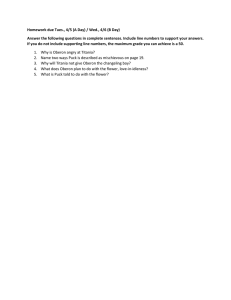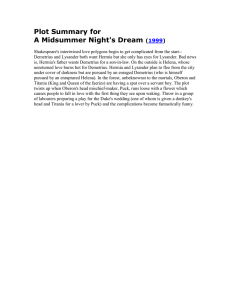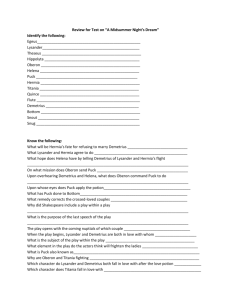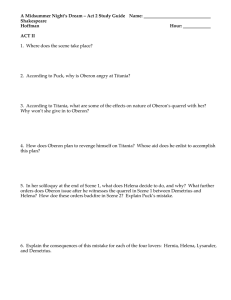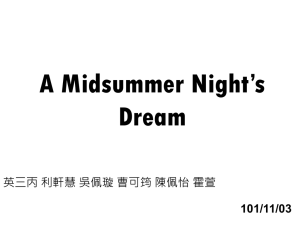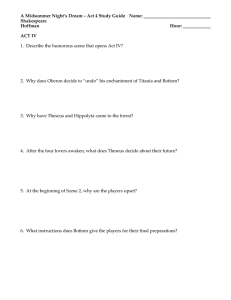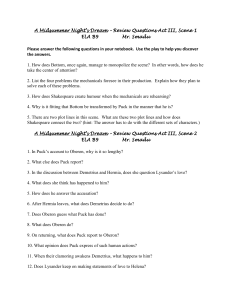T Study Guide
advertisement
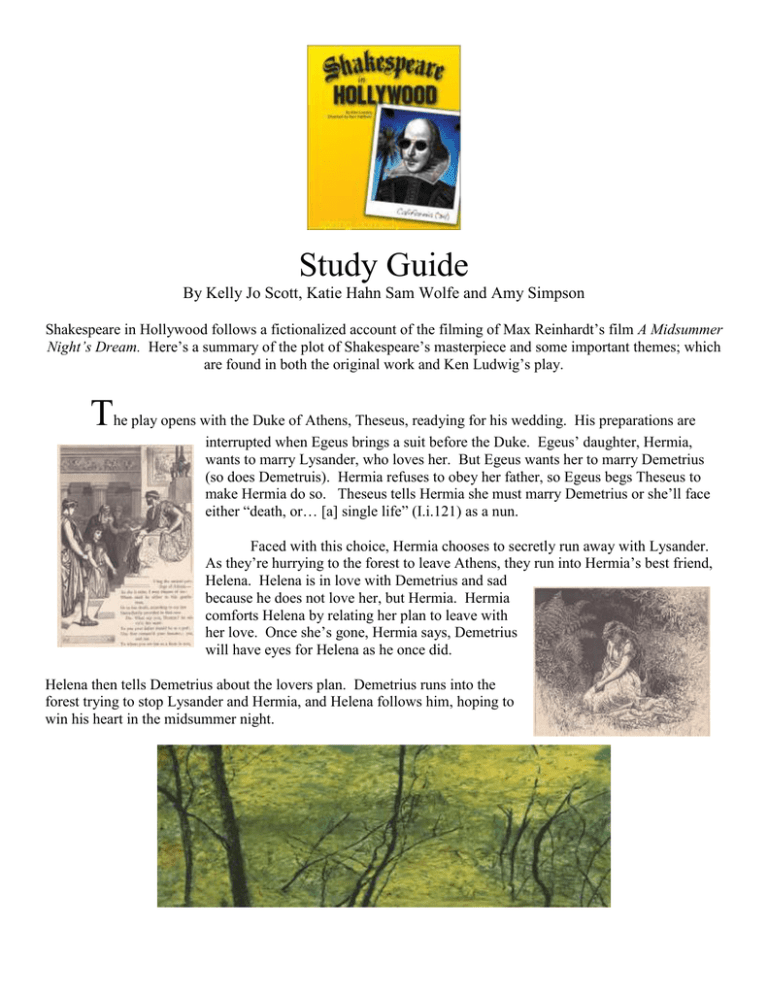
Study Guide By Kelly Jo Scott, Katie Hahn Sam Wolfe and Amy Simpson Shakespeare in Hollywood follows a fictionalized account of the filming of Max Reinhardt’s film A Midsummer Night’s Dream. Here’s a summary of the plot of Shakespeare’s masterpiece and some important themes; which are found in both the original work and Ken Ludwig’s play. T he play opens with the Duke of Athens, Theseus, readying for his wedding. His preparations are interrupted when Egeus brings a suit before the Duke. Egeus’ daughter, Hermia, wants to marry Lysander, who loves her. But Egeus wants her to marry Demetrius (so does Demetruis). Hermia refuses to obey her father, so Egeus begs Theseus to make Hermia do so. Theseus tells Hermia she must marry Demetrius or she’ll face either “death, or… [a] single life” (I.i.121) as a nun. Faced with this choice, Hermia chooses to secretly run away with Lysander. As they’re hurrying to the forest to leave Athens, they run into Hermia’s best friend, Helena. Helena is in love with Demetrius and sad because he does not love her, but Hermia. Hermia comforts Helena by relating her plan to leave with her love. Once she’s gone, Hermia says, Demetrius will have eyes for Helena as he once did. Helena then tells Demetrius about the lovers plan. Demetrius runs into the forest trying to stop Lysander and Hermia, and Helena follows him, hoping to win his heart in the midsummer night. H owever, Helena’s plan does not work. She follows Demetrius as a dog follows an angry master, craving his attention no matter how much he spurns her. They are overheard by the king of the fairies, Oberon, who lives in the forest. Oberon has been in a fight with the queen of the fairies because she has a changeling boy that Oberon wants. Oberon decides he can fix both his problem and Helena’s with one simple flower. He sends his servant, Puck (a meddling spirit), to The potion, when dropped on a sleeping person’s person they see. fetch a flower with a special potion in it. eye, makes them fall in love with the first Oberon tells Puck to put the potion on Demetrius’ eyes so that he will love Helena, and on the queen’s eyes so that she will fall in love with some creature and will be too distracted, being in love, to notice that Oberon is taking the changeling boy. Puck does just as he is instructed with the queen, but unfortunately puts the potion on Lysander’s eyes. Helena comes upon Lysander and wakes him, immediately activating the potion to make him fall in love with her. All confusion breaks out as the lovers fumble around in the forest, chasing and fighting one another for the person they “love”. Eventually Oberon and Puck clean up the confusion just in time for the sun to rise and the lovers to be reconciled to, and share a wedding day with, Duke Theseus. Ken Ludwig’s Shakespeare in Hollywood is set on the 1934 Warner Bros. movie set for Max Reinhardt’s film version of Shakespeare’s A Midsummer Night’s Dream. Two of Shakespeare’s more widely known characters, Oberon and Puck, have mystically appeared on set by mistake whilst they were traveling home after the action of Midsummer. Ludwig’s farcical comedy mirrors the action of the play he draws from. However, Midsummer isn’t the only Shakespearean play that Ludwig pulls from. What follows is a list of Shakespeare’s works that are either directly quoted or paraphrased by Ludwig. Can you match the qoute/paraphrase with the correct work? Hint: Some plays are used more than once. A Midsummer Night’s Dream Antony and Cleopatra As You Like It Hamlet Macbeth Merchant of Venice Much Ado About Nothing Romeo and Juliet Sonnet 18 The Tempest Twelfth Night From Shakespeare in Hollywood: Oberon: “We are such stuff as dream are made on.” Oberon: “O brave new world that hath such creatures in it.” Puck: “Aye, there’s the rub.” Will Hays: “I could make me a willow cabin at my gate And let the babbling gossip of the air cry out...” Oberon: “Just speak the speach, I pray you.” Oberon: “Do you insult me? Call me villain?” Oberon: “When the sweet wind did gently kiss the trees.” Oberon: “Upon your words / Sit laurel victory, and smooth success / Be strewed before you feet. Hays: “I’ll be revenged upon the whole pack of you!” Olivia: “In such a night / Stood Dido witha willow in her hand. Upon the wild sea-banks, and waft her love. / To come again to Carthage. Puck: “The barge she sat in, like a burnished throne, burned on the water!” Oberon: “Have patience and endure.” Oberon: “I would live in her heart, die in her lap, and be buried in her eys.” Olivia: “O that I were a glove upon that hand!” Hays: “But soft! What light from yonder window breaks! It is the East, and I am the sun!” Hays: “Is this a swagger I see before me?” Hint: paraphrased word Hays: “Lead on, MacDuff!” Hint: paraphrased word Oberon: “We shall go coupled and inseparable, like Juno’s swans.” Hays: “Shall I compare thee to a summer’s day? Thou art more lovely and more temperate. Rough winds do shake the darling buds of May –” in A Midsummer Night’s Dream and Shakespeare in Hollywood Do you see these themes in either or both plays? Where? What do the play seem to be saying about these themes? Identity Love Fidelity “Reason and love keep little company” Obedience Civil Distress Theatricality A play within a play Dreams Characters escape their world (the lovers into the forest in Midsummer and Puck and Oberon in Hollywood) but only for a brief time, until they must return. Pg. 24 Puck: “swift as shadow, brief as lightning in the collied night:” A paraphrase of something Lysander says to Hermia in Midsummer 1.1. “Swift as a shadow, short as any dream, Brief as the lightning in the collied night” Oberon: Wither wander you, spirit? Puck: “Over hill, over dale” Opening lines of Midsummer 2.1. In Shakespeare in Hollywood, Oberon speaks Puck’s line, while Puck speaks the First Fairy’s. Pg. 25 Oberon’s “we are such stuff as dreams are made on” The Tempest, 4.1 (“and our little life is rounded by a sleep”) Pg. 26 Puck’s “aye, there’s the rub” Hamlet, “to be or not to be” speech Oberon’s “coddle-pated, lack-brained, thick-eyed…” This plays upon Shakespeare’s fondness for piling insults upon each other. “Three-suited” appears in King Lear, in what is supposed to be the longest Shakespearean insult: A knave, a rascal, an eater of broken meats, a base, proud, shallow, beggarly, three-suited, action -taking, whoreson glass-gazing, superserviceable, finical rogue; one-trunk-inheriting slave; one that wouldst be a bawd in way of good service, and art nothing but the composition of a knave, beggar, coward, pander, and the son and heir of a mongrel bitch, one whom I will beat into clamorous whining if thou deniest the least syllable of thy addition. -Lear 2.2 “No more brain than a Christian” is a paraphrase of Andrew Aguecheek’s “no more wit than a Christian” in Twelfth Night, used to describe himself. Pg. 27 Oberon’s “But who comes here?” Midsummer, 2.1 (Oberon says this as Demetrius and Helena enter) Pg. 30 Oberon’s “O brave new world…” The Tempest, 5.1 Puck’s “I go, I go” Midsummer, 3.2 Pg. 32 Oberon’s “When the sweet wind did gently kiss the trees” Merchant of Venice, 5.1; Spoken by Lorenzo to Jessica Oberon’s “Just speak the speech” Hamlet’s instruction to the actors, 3.2 Pg. 34-5 Olivia and Oberon’s Midsummer lines Midsummer 1.1, lines spoken by Hermia: first to Theseus, and then to Lysander. Pg. 36 Oberon’s “Upon your words…” Antony and Cleopatra, 1.3, Spoken by Cleopatra to Antony. Actual text is “upon your sword…” Pg. 37 Oberon’s “Have patience and endure” Much Ado About Nothing, 4.1. Spoken by the Friar to Hero Oberon’s “Do you insult me? Call me villain?” Hamlet, 2.2 Pg. 38 Oberon: “like Niobe, turned to stone” -NOT DIRECTLY FROM SHAKESPEARE A mortal woman in Greek mythology, Niobe, daughter of Tantalus and either Euryanassa, Eurythemista, Clytia, Dione, or Laodice, and the wife of Amphion, boasted of her superiority to Leto because she had fourteen children (Niobids), seven male and seven female, while Leto had only two. Apollo killed her sons as they practiced athletics, with the last begging for his life (Apollo would have spared his life, but had already released the arrow), and Artemis, her daughters. Apollo and Artemis used poisoned arrows to kill them, though according to some versions a number of the Niobids were spared (Chloris, usually). Amphion, at the sight of his dead sons, either killed himself or was killed by Apollo after swearing revenge. A devastated Niobe fled to Mount Sipylus in Asia Minor and turned into stone as she wept, or committed suicide. Her tears formed the river Achelous. Zeus had turned all the people of Thebes to stone and so no one buried the Niobids until the ninth day after their death, when the gods themselves entombed them. Mount Sipylus has a carving of a female face on it that the locals claimed was Niobe, though it was probably originally intended to be Cybele. The rock appears to weep because it is porous limestone and rainwater seeps through the pores. Shakespeare mentions Niobe twice in his plays: Hamlet, in his “O, that this too, too solid (or “sullied”) flesh would melt” soliloquy, refers to “Niobe, all tears,” but we haven’t found a more direct corollary to this speech. Pg. 42 Oberon’s speech “Thou rememb’rest…” Midsummer, 2.1 Pg. 47 Lydia’s lines as Helena paraphrased from Midsummer 2.2 Pg. 49 Oberon’s “Think of a world that’s full…” After the first three lines, this speech paraphrases Titania, speaking of the activities of her train in Midsummer 2.1 Pg. 53 Olivia: “To answer by the method, you may indeed, sir. With all my heart.” Echoes Twelfth Night, 1.5: Viola: “To answer by the method, in the first of his heart.” Oberon’s “we shall go coupled” paraphrase of Celia in As You Like It, 1.3 Pg. 54 Oberon: “If there be dancing, shall we rock the ground?” echoes Midsummer, 4.1 Obe. Sound, music! [Still, music. ] Come, my queen, take hands with me, And rock the ground whereon these sleepers be. Now thou and I are new in amity, And will to-morrow midnight solemnly Dance in Duke Theseus’ house triumphantly, And bless it to all fair prosperity. There shall the pairs of faithful lovers be Wedded, with Theseus, all in jollity. Oberon’s “I would live in her heart…” Paraphrase of Benedick’s, “I would live in thy heart, die in thy lap, and be buried in thy eyes” at the end of 5.2, Much Ado About Nothing Pg. 56 Oberon’s “Welcome wanderer…” Midsummer 2.1 Pg. 57 Oberon’s “Mark me, Robin, take this herb…” This speech parallels Oberon instructing Puck to find Demetrius at the end of Midsummer 2.1 Pg. 58 Lydia’s “You draw me…” Midsummer 2.1, 195-8 Pg. 59 Powell’s “My Hermia, if thou lovest me” and Hermia’s “I swear to thee…” Midsummer 1.1 Pg. 60 Hermia’s “God speed, fair Helena” and Helena’s “Call you me fair?” Midsummer, 1.1 Pg. 62 Puck’s “nicely done, Mad Spirit” a paraphrase of Midsummer, 2.2, when Puck mistakenly places the flower oil on Lysander’s eyes. Pg. 63 Olivia’s “never so weary…” Midsummer, 3.2, before she falls asleep and Puck sets everything aright. Pg. 65 Brown’s “O Wall, full often…” Midsummer 5.1 Cagney’s “I see a voice…” Midsummer 5.1 Puck’s “Up and down…” Midsummer 4.1 Pg. 66 Powell’s “tide life, tide death!” Midsummer, Thisbe’s line in the play-within-a-play, 5.1; “‘Tide life, ‘tide death, I come without delay. Powell’s “Goddess, nymph, divine creature!” paraphrased from Midsummer 3.2, Demetrius’ speech upon waking up and seeing Helena with the flower oil in his eye. Powell’s “send me to the Antipodes…” Paraphrased from Much Ado About Nothing, 2.1; when Benedick asks his friends during the masked ball to send him to the far corners of the earth instead of spending one more minute with his nemesis Beatrice. Pg. 68 Olivia’s “love looks not with the eye…” From Helena’s soliloquy, Midsummer, 1.1 “Moth! Peaseblossom! Mustardseed!” Titania’s fairies in Midsummer S.i.H. II.i. This scene parallels Midsummer 3.2, when Oberon and Puck discover that Puck’s enchanted the wrong Athenian. Pg. 72 Puck’s “The barge she sat in…” Antony & Cleaopatra, 2.2 Enobarbus reporting on Cleopatra Pg. 73 Olivia’s “Love and reason keep little company nowadays” Midsummer 3.1, the transfigured Bottom speaking to Titania Olivia’s “O spirit of love…” Twelfth Night, 1.1; From Orsino’s opening speech Pg. 74 Olivia’s “O that I were a glove upon that hand” Romeo and Juliet, 2.2 Oberon’s insults sound Shakespearean but are really Ludwigean. Pg. 75-6 Hays’ speech to his mirror Hays concocts a heady stew of Shakespearean quotes and paraphrases that also seems to parallel Malvolio in Twelfth Night, after he reads the forged letter from “Olivia.” “But soft! What light from yonder window breaks!” paraphrased from Romeo’s speech, Romeo and Juliet 2.2 “’Tis beauty truly blent!” “'Tis beauty truly blent, whose red and white Nature's own sweet and cunning hand laid on.”; Viola, Twelfth Night, 1.5 “Is this a swagger I see before me?” paraphrased from Macbeth 2.1, “is this a dagger that I see…” “My person beggars all description…” The first of several more quotes or paraphrases from Enobarbus’ description of Cleopatra in Antony and Cleopatra, 2.2 “For her own person, / It beggar'd all description" “I could hop forty paces through the street and make defect perfection” Again paraphrased from Enobarbus, Antony and Cleopatra, 2.2 I saw her once Hop forty paces through the public street, And having lost her breath, she spoke and panted, That she did make defect perfection, And breathless, pour forth breath. “I could make me a willow cabin at my gate…cry out ‘Will Hays! Will Hays!’” paraphrased from Voila’s speech to Olivia in 1.5 of Twelfth Night “To be or not to be me, That is the question!” paraphrased from Hamlet’s soliloquy 3.1 “I’ll smile and smile and be a villain” My tables, - meet it is I set it down, That one may smile, and smile, and be a villain; At least I'm sure it may be so in Denmark. -Hamlet (1.5) “There shall be no more compromises!’ if the comparison with Malvolio holds true, might echo Sir Toby’s comment to Malvolio in Twelfth Night, 2.3: “Sir, ye lie. Art any more than a steward? Dost thou think, because thou art virtuous, there shall be no more cakes and ale?” “Lead on, MacDuff!” Common misquotation of Macbeth’s penultimate line: “Lay on, Macduff! And damned be he who first cries, ‘Hold, enough.’” Pg. 79 Hays’s “Shall I compare thee to...” from Shakespeare’s Sonnet 18 Shall I compare thee to a summer's day? Thou art more lovely and more temperate. Rough winds do shake the darling buds of May, And summer's lease hath all too short a date. Sometime too hot the eye of heaven shines, And often is his gold complexion dimmed; And every fair from fair sometime declines, By chance, or nature's changing course untrimmed. But thy eternal summer shall not fade Nor lose possession of that fair thou ow'st; Nor shall death brag thou wand'rest in his shade, When in eternal lines to time thou grow'st, So long as men can breathe or eyes can see, So long lives this, and this gives life to thee. Pg. 80 Lydia/Louella parallel to Midsummer parallels the fight between Helena and Hermia in Midsummer, 3.2 Pg. 81 Louella’s “Age cannot wither me…” modeled off Enobarbus’ next speech following “hop forty paces . . . “Antony and Cleopatra, 2.2: Never; he will not: Age cannot wither her, nor custom stale Her infinite variety: other women cloy The appetites they feed: but she makes hungry Where most she satisfies; for vilest things Become themselves in her: that the holy priests Bless her when she is riggish. Pg. 83 Oberon’s “Be as thou wast wont to be…” Midsummer 4.1, spoken to the sleeping Titania Pg. 84 Oberon’s and Olivia “In such a night” From the opening of The Merchant of Venice, 5.1, when Lorenzo and Jessica pledge their love. (also on page 20). The entire exchange runs: Lor. Jes. Lor. Jes. Lor. Jes. The moon shines bright: in such a night as this, When the sweet wind did gently kiss the trees And they did make no noise, in such a night Troilus methinks mounted the Troyan walls, And sigh’d his soul toward the Grecian tents, Where Cressid lay that night. In such a night Did Thisbe fearfully o’ertrip the dew, And saw the lion’s shadow ere himself, And ran dismay’d away. In such a night Stood Dido with a willow in her hand Upon the wild sea-banks, and waft her love To come again to Carthage. In such a night Medea gather’d the enchanted herbs That did renew old Æson. In such a night Did Jessica steal from the wealthy Jew, And with an unthrift love did run from Venice, As far as Belmont. In such a night Did young Lorenzo swear he lov’d her well, Stealing her soul with many vows of faith, And ne’er a true one. Pg. 86 Cagney’s “I have had a dream past…” Midsummer, 4.1 Bottom, on awakening without his ass’s head. Pg. 90 Oberon’s “a meddling monkey or busy ape” From Midsummer, 2.1 (180-1). Spoken by Oberon when discussing the power of love-in-idleness, and how when Titania awakens, she will pursue the first thing she sees, whether it be “lion, bear, or wolf, or bull, on medding monkey or on busy ape” Pg. 94 Hays’ “I’ll be revenged upon the whole pack of you!” Malvolio’s parting line in Twelfth Night, 5.1 Pg. 96 Puck’s “What fools these mortals be…” Midsummer, 3.2 Pg. 97 Oberon’s “I know a bank where…” paraphrased from Midsummer 2.1 Brief Overview of Shakespeare in Hollywood Time Period and Real Characters The Golden Age of Hollywood________________________________________________________________ 8 major studios held the monopoly on filmmaking Fox Film Corporation (20th Century Fox) Loew’s Incorporated (Later MGM) Paramount Pictures RKO Radio Pictures Warner Brothers Universal Pictures Columbia Pictures United Artists Warner Brothers was at the lower end of the money-making chain In spite of the depression, movies continued to be successful throughout the 1930s More than 80 million people went to the movies each week To see a movie cost around 15 cents Studio Relations___________________________________________________________________________ “The Studio System” Studios created on their own with whomever was employed by them The heads of the studios pretty much ruled the world No one went anywhere in Hollywood without one of the Big 8’s support Actors/Actresses belonged to studios and could only work in their studio’s productions unless they were “exchanged” Exchanges would occur if other filmmakers wanted specific actors, they would have to give one of their own desirable actors to the other studio for a certain project Such was the case in an MGM/Fox battle over Shirley Temple for the Wizard of Oz. Shirley was intended to play Dorothy but because of the death of one of the actresses the studios were trading for, the deal was cancelled and Judy Garland was selected instead. Characters from History____________________________________________________________________ Max Reinhardt Director of A Midsummer Night’s Dream- between 1905 and 1934 he directed the production in various capacities 13 times Believed in truly creating the world of the story so he brought in real birds, plants, and other elements of forests to build the set of the movie Jack, Harry, Albert and Sam Warner Owners and heads of the Warner Brothers Production Company Jack and Harry controlled the studio as a whole while Albert and Sam handled more of the business aspects Though Sam is alive in Shakespeare in Hollywood which is set in 1934, the real Sam Warner actually passed away of pneumonia in 1927 Louella Parsons One of the most famous Hollywood “gossips” of all time Also wrote screenplays. One of hers that was produced was a movie called The Magic Wand Hosted her own show called “Hollywood Hotel” where she interviewed different celebrities. Her opinion on films was considered the final judgment of all critiques James Cagney One of the most popular actors of the time period Typically known for playing gangster roles, it was a shock when he was cast as Bottom in the movie Characters from History Continued___________________________________________________________ Dick Powell A famous actor and Hollywood player in the era Worked as a singer, actor, producer, director and studio boss Did not want to be cast in Midsummer but accepted it because he wanted more serious work Darryl F. Zanuck Prominent producer, actor, writer, director and studio executive Was head of production for Warner Bros. from 1931-1933 Olivia de Havilland Famous actress of the era who got her start in Max Reinhardt’s Hollywood Bowl production of Midsummer Did so well in the play that she was asked to reprise her role as Hermia for the film, which was her first film Eventually formed many boycotts against censorship and was a leader in the fight for actors to become “free agents” Joe E. Brown Popular comedian of the time period Was famous for his musical comedies and character roles. He had also appeared in other Shakespeare productions so his portrayal of the character Flute was well prepared Inspired the character of Superman William H. Hays The primary spokesman and creator of film censorship and the production code, later named for him as the Hays Code Was the first president of the Motion Picture Producers and Distributors of America Though he’s often depicted negatively, Hays was actually a large player in fighting for studio rights and tried to bridge the gap between Hollywood and government censorship. The Hollywood Chronicle March 31st, 2010 PRODUCTION COMPANIES MUST CENSOR! The Motion Pictures Producers and Distributors Association (MPPDA) adopted a set of regulations today that will govern the way films are made. The regulations will inform the production studios on what is appropriate and may be included in all future productions. It will be called The Production Code (later the Hays Code, named for the creator and enforcer, William H. Hays). The Production Code enumerates three "General Principles" as follows: 1. No picture shall be produced that will lower the moral standards of those who see it. Hence the sympathy of the audience should never be thrown to the side of crime, wrongdoing, evil or sin. 2. Correct standards of life, subject only to the requirements of drama and entertainment, shall be presented. 3. Law, natural or human, shall not be ridiculed, nor shall sympathy be created for its violation. The following restrictions are "Particular Applications" of these principles: * Nakedness and suggestive dances are prohibited. * The ridicule of religion is forbidden, and ministers of religion are not to be represented as comic characters or villains. * The depiction of illegal drug use is forbidden, as well as the use of liquor, "when not required by the plot or for proper characterization". * Methods of crime (e.g. safe-cracking, arson, smuggling) is not to be explicitly presented. * References to alleged sexual perversion (such as homosexuality) and immoral diseases are forbidden, as are any depictions of childbirth. * The language section bans various words and phrases that are considered to be offensive. * Murder scenes have to be filmed in a way that discourages imitations in real life, and brutal killings may not be shown in detail. "Revenge in modern times" is not to be justified. * The sanctity of marriage and the home has to be upheld. "Pictures shall not imply that low forms of sex relationship are the accepted or common thing". Adultery and illicit sex, although recognized as sometimes necessary to the plot, may not be explicit or justified and are not supposed to be presented as an attractive option. * Portrayals of miscegenation (inter-racial marriage and procreation) are forbidden. * "Scenes of Passion" are not to be introduced when not essential to the plot. "Excessive and lustful kissing" is to be avoided, along with any other treatment that might "stimulate the lower and baser element". * The flag of the United States is to be treated respectfully, and the people and history of other nations are to be presented "fairly". * The treatment of "Vulgarity", defined as "low, disgusting, unpleasant, though not necessarily evil, subjects" must be "subject to the dictates of good taste". Capital punishment, "third-degree methods", cruelty to children, animals, prostitution and surgical operations are to be handled with similar sensitivity. The new code will cause an uproar that Hollywood has never experienced and lead to the eventual downfall of the studio system. Actors will become "free agents" and no longer have to rely on the authority of production companies because all of the performers and workers will band together to bring down the Hays Code and remove power from Hollywood officials. 1930s Slang Term Word Search WORD BANK APPLESAUCE- Nonsense BOOCOO- A large amount CHEATERS- Glasses CRACKERS- Insane DADDY- Name for a man DOLL- Name for a woman HOOPTYDOO- Expression of excitement KOSHER- Something that is fair PALOOKA- A strong, handsome man RAZZ- To tease BOFF- To hit MACK- A name for a man LAMEBRAIN- A stupid or foolish person NOGOODNIK- A bad person HOOEY- Nonsense FADE- To leave a place MALARKEY- Nonsense DRIP- A weak person Suggested Activity Hollywood Studio Exchange Have the students break up into 8 teams The teams should be named for the 8 major studios of the time: Fox Film Corporation (20th Century Fox), Loew’s Incorporated (Later MGM), Paramount Pictures, RKO Radio Pictures, Warner Brothers, Universal Pictures, Columbia Pictures, United Artists Using slang terms of the time period, have the students plan to produce a certain film. Then they can negotiate trades of major players to be in their films. Try to use the names of real people of the age: Olivia de Havilland, James Cagney, Joe E. Brown, Anita Louise, Vivienne Leigh, Clark Gable, etc. Once they’ve all successfully traded actors they can plan what else they can do to produce their films Another idea is to have someone act as William H. Hays and call out censorship rules to any inappropriate behavior or use of slang terms. He can also deny them the right to produce a film if he deems it in violation of the production code. This activity is great to get them experiencing the language and business of the time period. It helps them understand how the studios interacted and treated the performers like property. Encourage the students to really explore the era! If possible, dim the lights and play 1930s music. Max Reinhardt is a significant character in Ludwig’s play and representative of many who left Europe, unhappy with the development of the Third Reich in Germany. Check out our timeline, which follows Max Reinhardt’s life as well as the events leading up to World War II in Germany. Pick a significant person in 1930s Hollywood OR who was involved heavily in WWII, either in Europe or America. Create an identification card for that person, complete with their picture and researched information about them. Think about how this person was perceived by the public around him/her and be sure to record that information on the card (so in Europe, race will obviously be a big deal, along with who was a member of the Nazi party, etc.). Once you have fully researched your person and presented your card, interact with the other students in class as if you were that person. Incorporate movement, attitudes, vocal quality and perhaps some of the 30s slang that is included in this study guide.
